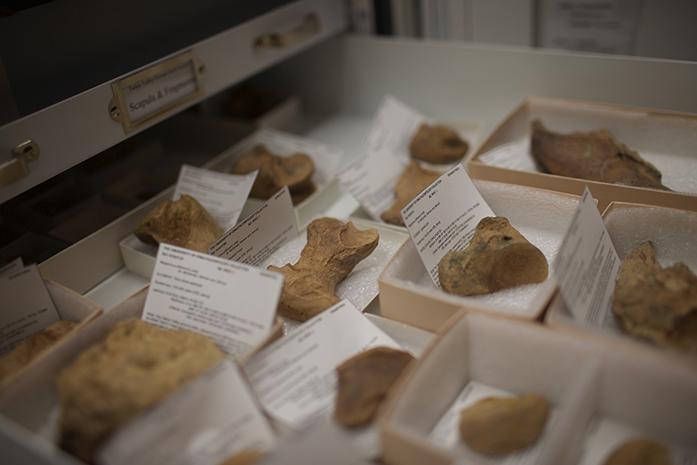DNR cuts mean more work for UI researchers
UI researchers will take on geological research after the state geologist was eliminated because of DNR budget cuts.
July 11, 2017
The elimination of the state geologist may not be a huge public concern, but some faculty and students have voiced their fears about where the state’s priorities lie.
The Iowa Department of Natural Resources announced last week it would eliminate several positions in response to a budget reduction totaling $1.2 million. Among these cuts was the position of state geologist, which has existed since 1855.
Researchers at the University of Iowa will now fulfill the state geologist’s duties through the Iowa Geological Survey.
This is not a completely new arrangement; the state has contracted UI faculty to conduct geological research, such as groundwater monitoring and bedrock mapping, for the last five years.
DNR official Alex Murphy said the role of the state geologist was to serve as a liaison between the UI and the DNR and as a public source for any geological information requests.
“Mostly the [state] geologist provided a lot of data work and really some oversight and responding to the Legislature or citizens,” Murphy said. “But the actual examining of rocks was done through the contract with the University of Iowa — the ‘hands-on,’ so to speak.”
Missouri and Michigan have state geologists, but several other Midwestern states have a geological-survey program or contract this kind of work through a state university.
Murphy said it is common for states to partner with universities for research, especially in geology, because of the opportunities for universities to receive grant funding.
UI Professor Larry Weber, the director of the IIHR — Hydroscience & Engineering, which oversees the Iowa Geological Survey, said students have the opportunity to help with conducting this research from numerous departments across the UI.
Even with the involvement of a university, Weber said, the position of state geologist is essential.
“[The state] geologist provides regulatory service to the university and represents the university in a number of ways as a go-to resource for information related to groundwater and geology, so it’s an important position for the state,” Weber said.
Murphy said the new arrangement without a state geologist will not be much of a change, and as discussions over budgetary issues continue, the position could be reinstated in the future. It is possible, he said, that the position could be placed at the UI rather than as a government job through the DNR.
However, some faculty and students at the University of Iowa are not pleased with the decision, among other cuts made to the DNR.
Weber said he is disappointed the Legislature has not prioritized natural resources in its funding decisions. He noted that other programs related to natural resources, such as the Iowa Flood Center, have been under threat of losing state funding.
“The DNR, along with many programs, is in a tough budget situation in the state of Iowa,” Weber said. “Many programs in the state have been cut that are important to our agricultural and economic services … We certainly hope for a bigger budget in the future, and hopefully, we’ll be working closely with our legislators to get those budgets restored.”
Some students are also concerned about the future of the career fields they will soon be entering.
Megan Henry, a UI graduate who triple-majored in music, German, and environmental science, said she and many of her peers have left the state seeking more promising opportunities in other states and countries.
She noted that all three of her majors are not at the forefront of political priorities nowadays, and that, in some ways, has driven her out of the state. She currently is living in Germany.
“I think the University of Iowa is an awesome place to do science, and I wish the state of Iowa would uphold its part of the bargain,” Henry said. “They fund this public university to give kids the opportunity to put their toes in an issue before they do their part to make the world a better place. It’s just strange to me that you would create this professional development program and then get rid of the profession.”
Murphy, however, said students should not feel discouraged by these decisions and should continue pursuing their dreams.
“In the state of Iowa, we are facing tough times with the budget … and we had to find areas where we could cut back,” Murphy said. “I wouldn’t discourage [students] from going into this field; there will still be positions out there.”
Despite this, Henry said, the state is closing off entryways for students who are interested in environmental protection to enter the workforce.
“Environmentalism and the science of the Earth is a really important topic, especially considering what’s going on with the Earth right now,” Henry said. “To get rid of the jobs for that and to get rid of the job-shadowing opportunities that are there, you close off a bunch of kids going for that opportunity.”



